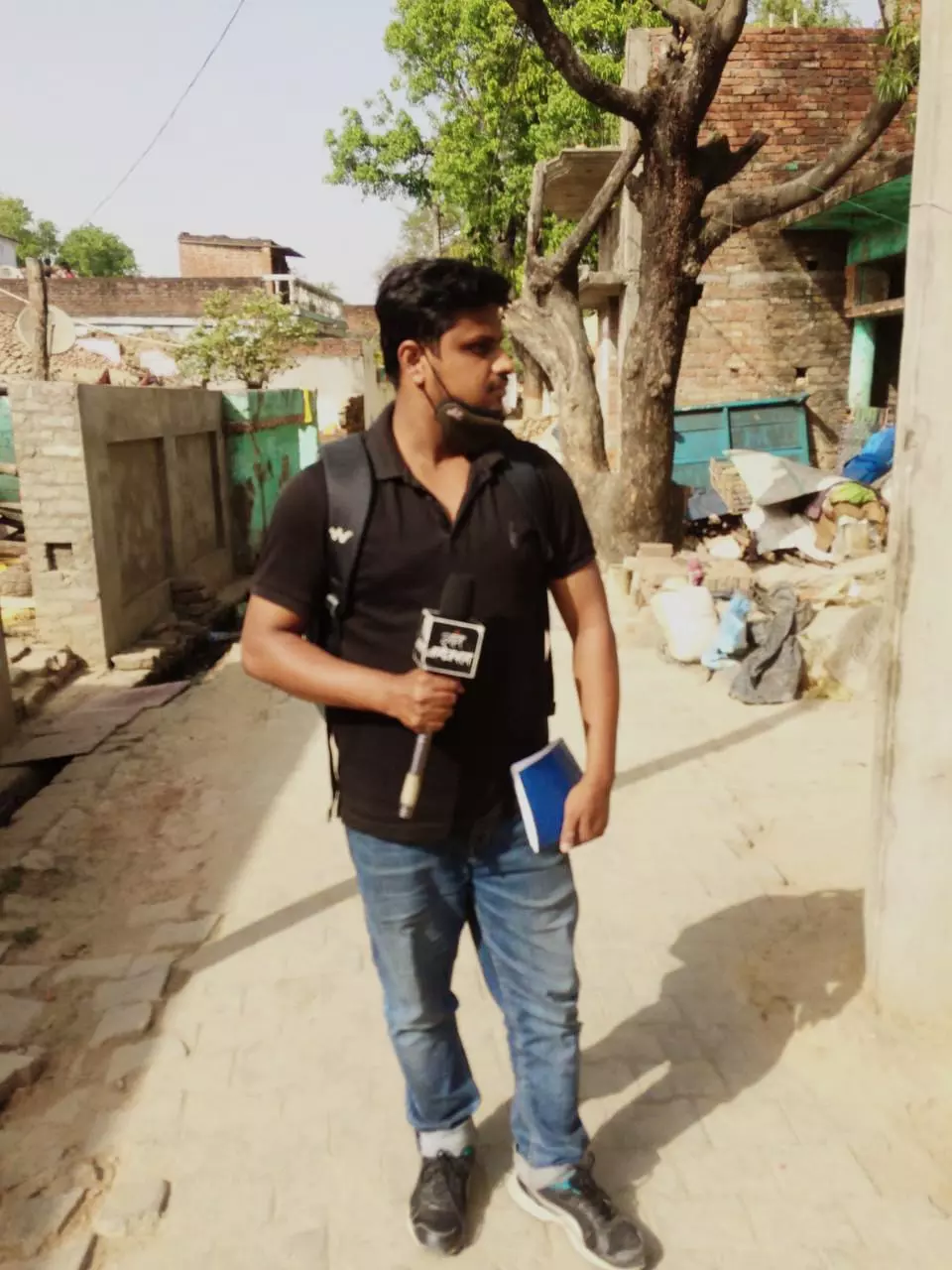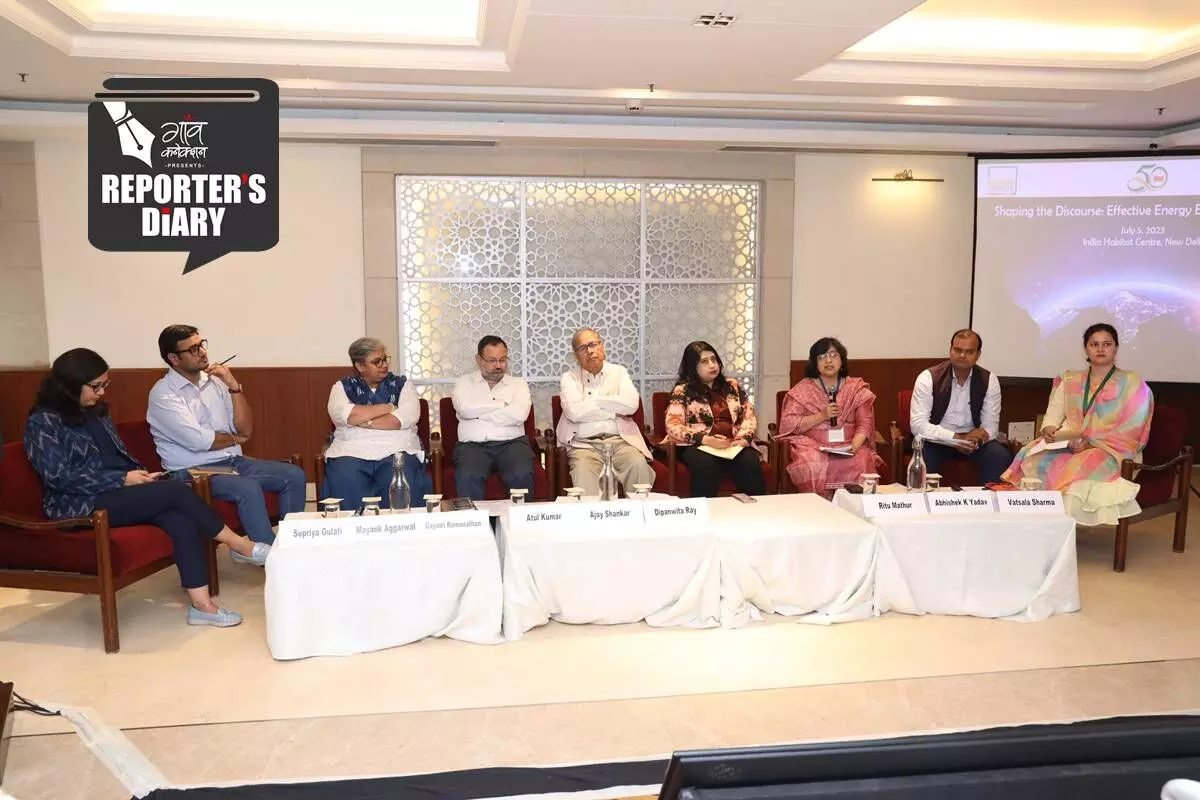Reporter’s Diary: Experts Urge Journalists To Use Effective Storytelling & Raise Awareness On Energy Efficiency
The media fraternity, advocacy groups and communications professionals discussed effective narrative techniques to use in order to raise awareness on the issue of energy efficiency. While the media was urged to present news in more engaging ways, the newspersons talked about the challenges of reporting on the energy efficiency beat. Details here.
 Pratyaksh Srivastava 15 July 2023 6:50 AM GMT
Pratyaksh Srivastava 15 July 2023 6:50 AM GMT

The experts agreed that in the transition towards net zero carbon emission, energy efficiency is the lowest hanging fruit. It’s the easiest to achieve and the lowest cost option. Photo courtesy: TERI
New Delhi
In a media workshop organised by The Energy and Resources Institute (TERI) in New Delhi on July 5, energy efficiency experts, communications professionals and journalists, discussed ways to improve public awareness about energy efficiency.
The one-day workshop, titled Shaping the Discourse: Effective Energy Efficiency Storytelling was organised in partnership with Climate Trends, a Delhi-based strategic communications company, and Kaizzen, a public relations firm.
One of the panel discussions at the event was moderated by Ajay Shankar, distinguished fellow, TERI and former secretary, Department of Industrial Policy and Promotion in the Government of India.
“The survival of mankind is now really at stake… things are really very stark. The latest IPCC [Intergovernmental Panel for Climate Change] report clearly says that the window of opportunity for adaptability is shrinking,” Shankar said.
The former secretary said how in the transition towards net zero carbon emission, energy efficiency is the lowest hanging fruit. It’s the easiest to achieve and the lowest cost option, he added.
Also Read: Wealthier urban households contribute much more to air pollution and GHG emissions
Meanwhile, Gayatri Ramanathan, senior director at the Kaizzen, a Delhi-based public relations firm claimed that the media coverage on the topic of energy efficiency is not much. “Today, the trending words are greenhouse gas emissions, energy transition, environmental, social, and governance factors, but energy efficiency factors in almost every single of these topics. It is a critical enabler for energy transition. It is actually the first step towards energy transition,” she pointed out.
“The media fraternity essentially needs to create a bridge by simplifying technical jargons in research and convey it to relevant target audience,” stressed Ms @supriyagulati55, Communications Manager, @AEEE_India during the panel discussion.#energyefficiency pic.twitter.com/w3mXBPi2oG
— TERI (@teriin) July 6, 2023
Another panellist Ritu Mathur, who presently serves as the senior energy economist at the NITI Aayog [National Institute for Transforming India], said there needed to be better public awareness about recycling when it comes to the energy efficiency paradigm.
“Energy efficiency is indeed the lowest hanging fruit, we also need to know what to pluck when. For example, in the urban environment, some of the costs associated with energy efficiency range from 20 dollars per tonne of CO2 abated to about 100 to 200 dollars. This calls for the need for more R&D [research and development] to assess what technologies can practically be employed to become more energy efficient,” Mathur said.
‘Quantifiable monetary benefit needs to be established’
Atul Kumar, a professor at the Jawaharlal Nehru University said that there is a lack of linkages within the realm of energy conservation and transition.
“You’ll find that the people working on renewable energy consider energy efficiency as a no-go area. In India itself, renewable energy and energy efficiency are dealt with by two separate ministries and I do not know how often they talk about the integration [of their efforts],” Kumar said.
“We also need to emphasise on reuse, reduce and recycle. The consumer needs to be convinced that energy efficiency is actually cost effective in the long term. If quantifiable monetary benefit is established in a low payback period, the energy efficiency is prioritised. In industry, it is happening. But in the household sector, public awareness needs to be improved, and that is where the role of media comes to the forefront,” he added. Interestingly, Supriya Gulati, communications manager at Delhi-based Alliance for Energy Efficient Economy, said how there was the need for stakeholders to be specific about the ‘nudges’ that are given to the public at large.
Mayank Aggarwal said that getting responses from experts on time while doing stories was a challenge for his comrades in the press, more so since they worked on deadlines.
“Are we triggering them about the need to be energy efficient or are we bringing ease into their lives or their work? We need to see the nudges we are giving. We need to be sure if we want to strengthen people to make decisions or if we want them to stop [doing] something. So, we need to create more people-centric and emotion-driven communication,” Gulati said.
Also Read: Energising rural India with reliable electricity supply
Meanwhile, Mayank Aggarwal, senior journalist and member of The Reporters’ Collective, said that the appetite of the news media needs to be better understood before attempting to implement any communication strategy around energy efficiency.
“Since we are talking about advocacy and policy push-pull in this workshop, the first thing we need to understand is how the media functions. Often, the same bunch of journalists are attending different types of conferences such as energy efficiency, renewable energy, climate change or G20. Not everything that reporters are encouraged to report on in such conferences can be immediately reported in a publication ,” he said.
How can there be an effective public discourse on #energyefficiency ? How is energy efficiency part of #India’s energy story? Discussed all this & more at @teriin workshop on energy efficiency. Thank you to all friends who attended & interacted. pic.twitter.com/GOwtMM4tYV
— Mayank Aggarwal (@journomayank) July 6, 2023
The journalist also said getting responses from experts on time while doing stories was a challenge for his comrades in the press, more so since they worked on deadlines.
“Reaching out to people is easier said than done. As media persons we are a bridge between advocacy and policy making but we have the compulsion to resist using these words in the newsrooms or else we are accused of being ‘agenda-driven’. So, the experts need to understand the struggles we face as journalists,” he added.
Energy efficiency discourse cannot ignore rural India
When Gaon Connection asked the panellists about the role and significance of the rural hinterland in achieving optimum energy efficiency in India, they stated that there are vast avenues to be explored.
“The context and storyline of energy efficiency is very different in the rural and urban areas. We need to understand that the reason we are trying to come up with low-energy technologies is because we know that there are areas where energy is not available throughout the day. We need to bring in energy efficient technologies which also develop the rural areas socially and economically,” Gulati, the communications professional, told Gaon Connection.
Aggarwal added that any talk on energy efficiency cannot ignore rural India.
“If we talk about the energy efficiency in the rural sector, there is a lot to explore. There is no way we can talk about energy efficiency without factoring in rural areas. Be it cooling solutions, food production or irrigation, the focus needs to also be on rural India when it comes to energy efficiency,” he told Gaon Connection.
Also Read: Solar projects that generate 'green' power, and also support farming and grazing
#TERI Energy Efficiency Climate Change
More Stories




